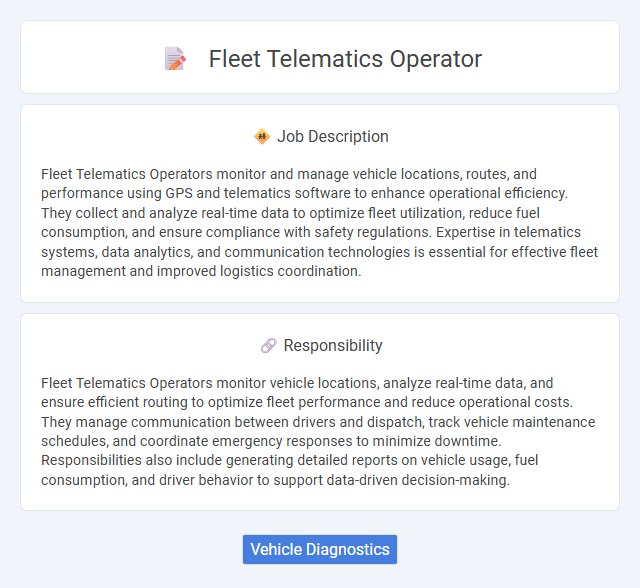
Fleet Telematics Operators monitor and manage vehicle locations, routes, and performance using GPS and telematics software to enhance operational efficiency. They collect and analyze real-time data to optimize fleet utilization, reduce fuel consumption, and ensure compliance with safety regulations. Expertise in telematics systems, data analytics, and communication technologies is essential for effective fleet management and improved logistics coordination.
Candidates with strong analytical skills and a keen interest in technology are likely suited for a Fleet Telematics Operator role. Those who thrive in fast-paced environments and possess good communication abilities may find this position aligns well with their strengths. Individuals uncomfortable with constant data monitoring or multitasking might face challenges adapting to the job requirements.
Qualification
A Fleet Telematics Operator requires expertise in GPS tracking systems, data analysis, and real-time vehicle monitoring to optimize fleet performance. Proficiency in telematics software, strong problem-solving skills, and knowledge of transportation logistics are essential qualifications. Certifications in telematics technology or related fields enhance job readiness and effectiveness in managing fleet operations.
Responsibility
Fleet Telematics Operators monitor vehicle locations, analyze real-time data, and ensure efficient routing to optimize fleet performance and reduce operational costs. They manage communication between drivers and dispatch, track vehicle maintenance schedules, and coordinate emergency responses to minimize downtime. Responsibilities also include generating detailed reports on vehicle usage, fuel consumption, and driver behavior to support data-driven decision-making.
Benefit
A Fleet Telematics Operator likely enhances route efficiency and reduces fuel consumption through real-time vehicle tracking. Improved vehicle maintenance scheduling could result in fewer breakdowns and lower repair costs. The role may also support enhanced driver safety by monitoring driving behaviors and ensuring compliance with regulations.
Challenge
The Fleet Telematics Operator role likely involves managing real-time data from multiple vehicles, posing challenges in ensuring seamless connectivity and accurate information flow. Handling diverse telematics systems and troubleshooting communication disruptions may require strong technical skills and quick problem-solving. The operator probably faces pressure to maintain operational efficiency and minimize downtime in fast-paced environments.
Career Advancement
Fleet Telematics Operator roles offer significant career advancement opportunities within logistics and transportation management sectors. Expertise in GPS technology, data analytics, and vehicle tracking systems enables progression to supervisory positions or specialized roles such as Fleet Manager or Telematics Analyst. Continuous skill development in IoT integration and real-time data interpretation enhances promotion prospects and salary growth in the evolving telematics industry.
Key Terms
Vehicle Diagnostics
Fleet Telematics Operators utilize advanced vehicle diagnostics systems to monitor engine performance, fuel efficiency, and maintenance needs in real-time. They analyze diagnostic trouble codes (DTCs) and sensor data to proactively identify mechanical issues, thereby reducing downtime and repair costs. Expertise in integrating telematics devices with fleet management software enhances operational efficiency and ensures compliance with safety regulations.
 kuljobs.com
kuljobs.com